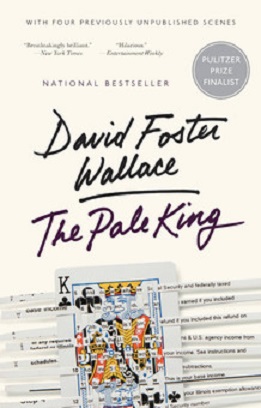The Pale King is David Foster Wallace’s third and final novel. He was a lifelong severe depressive, and tried just about everything to improve his condition short of lobotomy. Countless different medications, talk therapy, even electro-shock treatments (which, according to my psychiatrist mother, can be extremely beneficial in extreme circumstances despite its terrible reputation). In 2008 he was working as a creative writing professor at Pomona College in Southern California. Finally his pain became too unbearable, and he hung himself. A tragically sad end to a life far too brief. He was only 46 years old. I am 100 percent sure he had so much more to give. American literature suffered a tremendous loss with Wallace’s death.
For the last near-decade or so of his life, he was working on a follow-up novel to his iconic masterpiece, Infinite Jest—which in my opinion is one of the greatest, funniest books written in the 20th century. He typically referred to his novel-in-progress as The Big Thing. The reason became clear after his death: his wife collected thousands of pages of notes, scenes, fragments, and completed or partially completed chapters. She gathered all of this together in several boxes and sent them to his longtime editor, Michael Pietsch. He was the perfect man for the job. Pietsch helped Wallace pare down Infinite Jest—it was originally about TWICE its still-massive, nearly 1,000-page published version. Pietsch took thousands of pages of material and organized it into The Pale King, An Unfinished Novel. Yet there is strong evidence that the end product didn’t suffer tremendously from being incomplete; Wallace was clear that this novel would (naturally) be a strange one, that the plot would seem to be “leading to something happening, but nothing ever really happens” (D.T. Max, Every Love Story is a Ghost Story—a fabulous biography on David Foster Wallace).
In the end, we have in TPK what we have. It is still a wonderful read, sparkling with Wallace’s distinct voice, with his stunning and complex analyses, with his trademark black humor and cleverness, with his distinct descriptions, all of which are sui generis. Nobody has ever written quite like David Foster Wallace. Nobody ever will. Anyone who tries to will only come off as a wannabe, a failed facsimile, and nobody should even try.
This is true for all great writers and their admirers. Don’t try to copy them. Find your own voice, and if you love certain elements of a writer’s style, let them be an inspiration—incorporate elements of their style (as every writer does; no author ever in the history of literature becomes great or even good without having read many hundreds of other books), but MAKE THEM YOUR OWN. There are few things worse than a copycat-writer, and anyone who does it is destined to fail miserably.
The Pale King has its flaws, to be sure. But it’s still a marvelous read, just like ANYTHING by Wallace. Unfortunately, we only have three novels from him. I’d say in terms of quality this one falls somewhere between his terrific (but more flawed) first novel, The Broom of the System, and his inimitable 1996 magnum opus, Infinite Jest. I believe if Wallace had lived long enough to bring TPK to full fruition, complete with his obsessive perfectionism, it could’ve been a legitimate masterpiece in its own right. He was one of the very best writers of the last century. The fact that a book as entertaining, meaningful, fascinating, and funny as TPK could be culled from thousands of pages of fragments and pieces is only further testament to his greatness.
I give this book a 75 out of 100.

